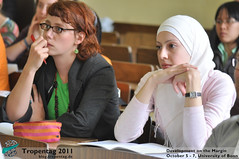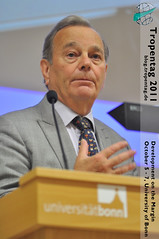Blogs
Should Bananas Be Weighed in the Future?
Thu, 10/06/2011 - 17:39 — Minette Flora M...
"Looks may be deceiving.” This is the reason why Ugandan bananas should be weighed, says Vinzenz B.M. Bauer. Another five presentors in today´s session on Marginal People II: Markets and Consumption also recommended viable options to improve the livelihood strategies of marginal people involved in market transactions:
- Masai women in Tanzania can generate higher incomes if they bring their fresh milk to the milk collection centers, according to the calculations of Tim K. Loos;
- Pastoralist groups in Marsabit County, Kenya can manage small-stock marketing projects if they have start up capital and trained on business management, says Michael Ngutu;
- Exporting gherkins is still a competitive option for smallholder farmers in Karnataka, India, added Nithya Vishwanath Gowdru;
- Guilia Secondini will assess the advantages and risks of small farmers participating in contract farming schemes of high value crops in Uttarakhand, a north Indian state;
- Christin Schipmann suggested that access to banks and group formation are needed by smallholder farmers involved in the sale of sweet pepper and morning glory in Bangkok, Thailand´s retail and traditional markets.
Rattan Lal, Sir Gordon Conway and Paul Richards on how to include small holders into carbon trade. Keynote Discussion Part 1/3
Thu, 10/06/2011 - 17:18 — De-Registered User
Worldbank sets a minimum amount of 2 Mio. € for carbon trade. That avoids small scale farmers from taking advantage of this trading scheme. Hear about the ideas of Rattan Lal, Sir Gordon Brown and Paul Richards!
This is part 1 of a series of videos.
Part 2: "What you're calling marginal is political opposition" Keynote Discussion
Part 3: Solutions to help people improve their situation, Rattan Lal, Sir Gordon Conway and Paul Richards discuss
Restoring dignity and responsibility: A bag with big intentions
Thu, 10/06/2011 - 17:04 — De-Registered User Katrin Pütz uses low-tech innovation to help rural communities establish village-level biogas systems
It’s about time we give people on the margin dignity and responsibility, demands Katrin Pütz of Hohenheim University. And she has a solution:
Enter the Biobag. A four layered, gas tight, one cubic meter bag that can be worn as a backpack.
The Biobag is part of a greater village level biogas system value chain. The envisioned system allows for capital investment, usually from commercial farmers or other investors, to finance the construction of a biogas plant. From here small-scale farmers can sell their animal’s dung to the biogas plant owner. Village residents can then bring their reusable Biobag to the plant to fill it up with fuel.
Solving rural poverty can be just this simple, anticipates Pütz.
Katrin Pütz uses low-tech innovation to help rural communities establish village-level biogas systems
It’s about time we give people on the margin dignity and responsibility, demands Katrin Pütz of Hohenheim University. And she has a solution:
Enter the Biobag. A four layered, gas tight, one cubic meter bag that can be worn as a backpack.
The Biobag is part of a greater village level biogas system value chain. The envisioned system allows for capital investment, usually from commercial farmers or other investors, to finance the construction of a biogas plant. From here small-scale farmers can sell their animal’s dung to the biogas plant owner. Village residents can then bring their reusable Biobag to the plant to fill it up with fuel.
Solving rural poverty can be just this simple, anticipates Pütz.
Behind the idea
After working in Rwanda on an agricultural project with farmers Pütz saw how development aid was working. She also saw how it created dependencies. “I became angry about how people were being treated,” reflects Pütz. She started to study again, but this time doing her master’s in agricultural engineering. It was during this time she learned about biogas and knew: “This is it!”Food and the Arab Awakening
Thu, 10/06/2011 - 16:42 — De-Registered User The capacity to produce sufficient and healthy food to feed its population has become a central issue in most of the middle and low income nations. Food insecurity and poverty go together in most cases. The poor are also the vulnerable. In a study conducted in the highlands of Ethiopia, it was found that the variables (such as education level, age, etc) that play a significant factor in leading to poverty where different from those affecting vulnerability. Nevertheless, the most vulnerable are those caught in the vicious circle of poverty. It was inferred from a research conducted in Tajikistan that the heterogeneity of the effect of food crisis across different household segments (like rural, urban etc) needs to be considered at policy level to create solutions that truly have an impact.
Agricultural Development – The Poverty Exit Strategy
The capacity to produce sufficient and healthy food to feed its population has become a central issue in most of the middle and low income nations. Food insecurity and poverty go together in most cases. The poor are also the vulnerable. In a study conducted in the highlands of Ethiopia, it was found that the variables (such as education level, age, etc) that play a significant factor in leading to poverty where different from those affecting vulnerability. Nevertheless, the most vulnerable are those caught in the vicious circle of poverty. It was inferred from a research conducted in Tajikistan that the heterogeneity of the effect of food crisis across different household segments (like rural, urban etc) needs to be considered at policy level to create solutions that truly have an impact.
Agricultural Development – The Poverty Exit Strategy
“Soil has to be the engine of economic development, use them, improve them and restore them”: Prof. Rattan Lal grants interview
Thu, 10/06/2011 - 12:44 — De-Registered User
A bit of background information about Prof. Lal
Prof. Rattan Lal is a professor of Soil Science in the School of Environment and Natural Resources at the Ohio State University, USA. He has been involved in several activities both in research and teaching. He is a member of the U.S National Committee on Soil Science of the National Academy of Sciences (1998-2002) and (2007-to date). He is the lead author of the Inter-governmental Panel on Climate Change (IPCC) which earned him the Nobel Peace Prize in 2007. Read more about him at http://senr.osu.edu/facview.asp?id=382
Student reporter : What would be your take home message to someone who is not present here at the Tropentag 2011 conference?
Prof. Lal : Several things depend on soil such as food security, water quality, climate change, production and biodiversity. Many ecosystem services which depend on soil are jeopardized because of poor soil management. Taking soils for granted has been the cause of many serious problems and we should avoid it.
Student reporter : How can we achieve good production on marginal soils?
The Meat behind an Enabling Environment
Thu, 10/06/2011 - 12:23 — De-Registered User
Sir Gordon Conway, an Ecologist from the Imperial College London well experienced in development policy, describes an environment with three key challenges for food security.
Challenges for food production.
1. One billion people hungry in the world.
2. A necessity of increasing food production by 70 to 100%.
3. A world price-crisis that still now is causing problems for marginalized people in developing and developed countries.
The higher demand for food is explained by a rising population, an increase in income of some countries with economic growth and energy policies (demand for bio-fuels). On the other hand, degraded lands, degraded water, impact of climate change is negatively affecting food production at a global scale. “Marginalized people are those who own less than 2 hectares of productive land, involving 400-500 million of smallholders, most of them in Asia and Africa.”
 Sir Gordon Conway, Key Note Speaker at Tropentag 2011.
Multiplier effect of agriculture.
Sir Gordon Conway, Key Note Speaker at Tropentag 2011.
Multiplier effect of agriculture.
 Sir Gordon Conway, Key Note Speaker at Tropentag 2011.
Multiplier effect of agriculture.
Sir Gordon Conway, Key Note Speaker at Tropentag 2011.
Multiplier effect of agriculture.
Agriculture and crashing jumbo jets - the first day of Tropentag
Thu, 10/06/2011 - 11:37 — De-Registered User
Looking back on the first day of Tropentag 2011
A ‘hub of discussion’, ‘the most important international conference for the development oriented scientific community’ or just a networking event… with more than 1000 participants from all over the world Tropentag is everything but boring. Looking back on the first day.
‘There are a billion people that are currently hungry. We’ve never had that number of hungry-stricken in the world before. If we’re going to feed the world by 2050 we need to increase food production by something as 70 to 100 percent. The food price spikes are going to recur and food prices will stay high.’ This statement of Sir Gordon Conway (Imperial College) during the plenary speeches on the first day of the Tropentag, will be leading during the whole conference in Bonn. These are the facts. How can research make a contribution to solve this problem?
Questions
As Claudia Mueller (University of Bonn) argued in the opening session of the Tropentag, research on ‘development of the margin’ is needed and should be a guiding principle for all researchers. ‘We will only be successful if we manage to improve the hunger situation for the marginalized in development.’ She raised questions such as how to balance development in favorable and marginal environments? Should marginalized people and communities become key players in an increasingly globalized resource use, and if so, how?
What is Stiftung fiat panis offering to young scientists? Dr. Andrea Fadani answers.
Wed, 10/05/2011 - 23:53 — De-Registered User
Stiftung fiat panis does help to make Tropentag 2011 reality. Dr. Andrea Fadani tells us what else the foundation is doing and which opportunities it is offering to young scientists.




